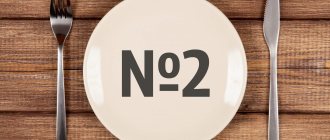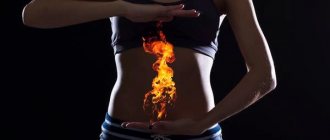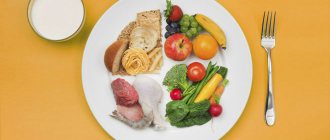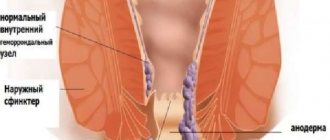The exact causes of hemorrhoids are still unknown to science, but one of the provoking factors for its development is errors in nutrition, leading to chronic constipation, hard feces, its constant presence in the rectum and straining during bowel movements. In addition, non-compliance with the diet, namely the consumption of spicy foods and alcohol, can lead to an exacerbation of the disease in people with a chronic form. In this case, not only inflammation of the hemorrhoids is observed, accompanied by pain and discomfort, but also bleeding from the anus, first only during bowel movements, and then outside of bowel movements.
General recommendations
Every patient should know how to eat with hemorrhoids so as not to harm themselves. The basis of the diet should be food containing coarse fiber. It is not digested in the digestive tract and softens the feces, thereby facilitating quick and easy bowel movements. It is found in fruits and vegetables, both fresh and thermally processed. Fiber also helps populate the intestinal microflora with beneficial bacteria, ensuring its proper functioning.
Bran is a source of coarse dietary fiber, which helps improve the digestion process.
Wheat and oat bran are sources of coarse dietary fiber, so you should definitely include them in your diet, for example, add them to ready-made dishes. No more than 60 g per day will be required.
Nutrition principles:
- Ensure uninterrupted soft bowel function to minimize injury to hemorrhoids.
- Enough fluid to soften the stool.
- You need to eat small meals and regularly.
- Consume wheat bran in moderation.
- Take medications with lactulose.
- When giving up meat, be sure to monitor your hemoglobin level to avoid anemia.
specialist
You can find out details about which diet is suitable for the patient from a proctologist at a clinic or in a private clinic. You can also consult with a specialist on our website. A proctologist will clarify how to eat properly in order to stop pathological processes in the rectum and prevent exacerbations of hemorrhoids. To get an answer to your question, you need to fill out the form located in the appropriate section of the site and under the banner after this article. You can also make an appointment with a proctologist surgeon by calling the numbers in the “Contacts” section.
What can you eat if you have hemorrhoids?
The list of recommended and permitted foods is quite large, so following a diet for hemorrhoids every day should be easy.
What to eat:
- Vegetables: beets, carrots, zucchini, cabbage, cucumbers, tomatoes, pumpkin, bell peppers.
- Porridge: buckwheat, corn, barley, millet.
- Greens: spinach, lettuce, dill, cilantro, celery, basil.
- Berries and fruits: melon, bananas, peaches, apricots, kiwi, plums, persimmons.
- Fermented milk products: cottage cheese, yogurt, kefir, yogurt.
The basis of the diet during periods of exacerbation should be vegetables. You can eat them either raw or boiled, baked, stewed or steamed.
Fruits can be eaten fresh, dried, dried, baked (for example, apples, which are not allowed to be eaten fresh) and in the form of compote. When choosing fruits, you need to pay attention to ripeness; it is ripened fruits that are useful for hemorrhoids.
It is recommended to eat fermented milk products, but not fresh milk.
Kefir should only be drunk fresh, on the day of production, since only in this case it weakens. You need to buy only natural yogurt, without flavorings or dyes, and it is better to add berries or fruits yourself. It is recommended to replace mayonnaise and sour cream with yogurt and kefir when preparing salads.
Important: It should be remembered that, despite all the benefits of vegetables and fruits, there should be a sense of proportion when consuming them. They can cause diarrhea, which means they can lead to inflammation of the anus and swelling.
What foods are allowed This category includes foods that are not prohibited from being consumed for hemorrhoids, but at the same time you should not eat them in large quantities and every day.
- Bakery products. Try to give preference to whole grain products with sesame, bran, flax and pumpkin seeds.
- The fish is lean. Haddock, cod, pike perch, pollock, hake, pike, perch, bream. Once a week you are allowed to indulge in fish of fattier varieties: trout, carp, flounder, tuna, chum salmon.
- Meat. Veal, turkey, chicken, rabbit.
- Eggs. No more than three times a week and only boiled, poached and in the form of an omelet.
- Cheese. No more than 2 times a week you can eat one piece of pickled cheese: feta, feta cheese, suluguni. Once a week you are allowed to eat soft, creamy curd varieties.
Important. You can't eat fried meat. It is recommended to bake it in foil, boil or steam it. It is advisable not to add spices and salt, with the exception of bay leaves and black peppercorns.
Is it possible to eat lard if you have hemorrhoids? This is a very fatty product that can negatively affect the gastrointestinal tract, so it is better not to include it in your diet.
It is recommended to use sauerkraut with caution. It is not prohibited for hemorrhoids in men and women, and is even beneficial for the intestines, but due to the mustard oil it contains, which contains sulfur, it can cause gas formation, fermentation and pain, which will immediately aggravate the symptoms of the disease.
Vegetables and fruits, sweets
If you have hemorrhoids, you should include peaches, apples, plums, melons and watermelons in your diet. Experts advise eating juicy fruits to prevent constipation. Fruits that are not ripe enough or that are too sour should be avoided. Such food can lead to stool upset, and diarrhea aggravates hemorrhoids due to irritation of the mucous membrane. Overripe fruits are undesirable, as they contribute to the fermentation process and cause flatulence.
Dried fruits are good for digestion, and nuts and seeds enrich the body with vegetable protein. Sweets allowed are honey, jam, marshmallows, marshmallows, and dry cookies. Sweets are consumed in small quantities, since simple carbohydrates lead to fermentation.
What not to eat if you have hemorrhoids
Strict restrictions are required only during an exacerbation or after surgical treatment. Following a diet helps:
- To a speedy recovery.
- Improvement of general condition.
- Relapse prevention.
You should not eat if you have hemorrhoids:
- Fried food. It worsens intestinal motility, makes stool harder, leads to constipation - all this injures hemorrhoids.
- Fat cheeses.
- Smoked meats.
- Spicy food.
- Semi-finished products.
- Pickled foods.
- Sweets and baked goods.
- Canned food.
- Salty.
- Vegetables and fruits containing a lot of essential oils and organic acids: radish, radish, sorrel, quince, blueberries.
- Citrus.
- Mushrooms.
- Products containing a lot of starch: semolina, potatoes, white rice, legumes.
- Chocolate.
- Coffee, black tea and cocoa.
- Drinks: carbonated drinks, concentrated juices.
- Kiseli.
Is it possible to eat garlic for hemorrhoids, as well as onions and green onions? After all, it’s hard to imagine an everyday table without onions and garlic. Unfortunately, during an exacerbation, these products will have to be abandoned.
It is very harmful to eat smoked sausages if you have hemorrhoids.
Effective treatment
To eliminate bleeding, the doctor may prescribe anti-inflammatory suppositories with adrenaline for rectal use.
To strengthen blood vessels, improve blood circulation in the nodes and increase capillary tone, he will definitely recommend a phlebotropic drug. For example, detralex, venoruton, venarus.
To normalize bowel movements and digestion, drugs are used: mucofalk, laminarid, duphalac, etc.
| Heavy bleeding | Suppositories with adrenaline, hemostatic drugs: adroxon, tachocomb or spongostan, dicinone, sodium etamisylate, aminocaproic acid. |
| For conservative treatment | Phlebotonic drugs Detralex, Phlebodia600, Venarus, Glivenon, Venoruton. |
| Pain syndrome | Non-narcotic analgesics: analgin, baralgin, painkillers in the form of gels, ointments and suppositories: nefluan, aurobin, ultraproct, posterizan-forte, proctoglivenol, posterisan, etc. |
| Prolonged bleeding | Sclerotherapy (injection with the drug) is used into the affected nodes. |
If there are traces of thrombosis on the hemorrhoids, direct anticoagulants are used.
Doctor's supervision is important! Even after successful treatment and bleeding cessation, you should see a doctor. The specialist will indicate further recommendations and adjust the diet.
THERE ARE CONTRAINDICATIONS CONSULTATION WITH YOUR DOCTOR IS REQUIRED
Author of the article Alexey Alexandrovich Egorov, proctologist
Write your opinion
Alcohol
If you have hemorrhoids, alcoholic drinks are prohibited. They thicken the blood, dilate veins, draw fluid from the intestines and promote swelling of soft tissues. When they are consumed in large quantities, there are frequent exacerbations of the disease, it progresses, new nodes appear, and old ones increase in size.
Alcoholic beverages are not allowed to be consumed in any form or stage of hemorrhoids.
general information
The occurrence of the inflammatory process of hemorrhoidal veins is often triggered by poor nutrition. A large number of harmful products increase the flow of blood to the pelvic organs, which causes overflow of the venous system and the appearance of hemorrhoids. Anyone who is faced with such a delicate disease is forced not only to take medications prescribed by the doctor, but also to follow a special diet.
Proper nutrition in such a situation is necessary to prevent constipation, because in case of hemorrhoids, bowel dysfunction aggravates the course of the disease.
Diet during exacerbation
In case of acute hemorrhoids, you need to follow a special diet (slag-free) to avoid bowel movements and irritation of the mucous membrane of the anus and hemorrhoids.
In the first three days the following menu is shown:
- meat broth;
- egg white omelette;
- oatmeal;
- white bread crackers (3 pieces per day);
- boiled lean meat minced through a meat grinder.
The patient is advised to drink plenty of fluids (water, herbal teas). At night you need to drink a glass of herbal infusion (senna, yarrow, licorice or buckthorn).
Causes
The disease occurs due to varicose veins of the anus. Proctologists treat hemorrhoids. Among the main causes of the pathology are improper diet, indigestion and frequent constipation, genetic predisposition, and numerous pregnancies in women.
People who spend a lot of time sitting are at risk of developing hemorrhoids. The same applies to those who engage in strength sports and work that involves lifting weights. Hemorrhoids in teenagers are not as common as in adults. The reason for the development of pathology at a young age is a tendency to varicose veins, chronic constipation, damage to the vessels of the anus.
Diet for every day
An approximate diet menu for hemorrhoids could be like this:
1st breakfast: oatmeal with dried fruits and herbal tea/omelet and herbal tea/pickled cheese, bread, diluted juice.
2nd breakfast: soft-boiled egg and juice diluted with water/beetroot salad and compote/baked apple and herbal tea.
Lunch: Vegetable soup with meat broth, carrot salad with boiled meat, herbal tea/vegetable soup, steamed fish, beet salad, compote/fish soup, vegetables with seafood, mineral water.
Afternoon snack: 2 walnuts, dried fruits (50 g) and herbal tea/cottage cheese with nuts and dried fruits, compote/vinaigrette, cereal bread, compote.
1 dinner: cottage cheese casserole, vegetable salad, compote/chicken fillet with vegetables and herbal tea/carrot cutlets with buckwheat and mineral water.
2nd dinner: organic yogurt/kefir/ryazhenka (glass).
What drinks should you prefer?
Drinks for hemorrhoids should also be treated with extreme caution. The list of prohibited items will include kvass, concentrated juices, carbonated water (including mineral water), and energy drinks. But fresh weak tea, fruit drinks, berry juices, dried fruit compote are not only allowed for consumption, but also healthy.
Anyone who suffers from hemorrhoids should drink at least 2 liters of clean water per day.
Alcoholic products are strictly prohibited. The ban applies not only to the period of exacerbation, but also to the time of remission.
Such drinks should not be consumed because they can aggravate the course of the disease and also cause complications.
What diet is needed after surgery?
It is very important to eat right after hemorrhoid surgery. Food should contribute to timely and problem-free bowel movements, so the following rules must be followed:
1st day. Fasting and drinking plenty of fluids.
2nd day. Eliminate from the menu foods that can lead to fermentation and increased gas formation. This includes radishes, turnips, white cabbage, radishes, milk, carbonated drinks, legumes, citrus fruits, grapes, and sweets. It is forbidden to eat foods that increase blood flow to the pelvis: smoked, spicy, pickled, fried, salted, alcohol, canned food, spices. Loose porridge with water (buckwheat), day-old bread, lean meat, fermented milk products, vegetable oil, fruits and vegetables are useful. It is best cooked by steaming, you can bake and boil. Number of meals - 5-6.
Principles of nutrition
The main objectives of the “antihemorrhoidal” diet are to restore impaired intestinal functions (eliminate constipation or diarrhea), normalize blood flow in the pelvic organs, and increase vascular elasticity.
General principles of nutrition:
- Maintain drinking regime. Considering that the density of stool depends on the amount of liquid consumed, it is important to consume at least 2 liters of water per day to thin the stool. With insufficient water intake, the transit of chyme through the intestines slows down. This leads to compaction of feces and damage to the veins of the anal canal (from bowel movements).
To combat constipation (especially long-term constipation), drink a third of the daily volume of water on an empty stomach (in 1-1.5 hours). The remaining portion of liquid is consumed throughout the day (in small sips).
- Enrich your daily diet with fiber. Dietary fiber is the basis of dietary nutrition for hemorrhoids. Fiber helps increase the volume of stool and smooth bowel movements. Along with this, pectins have an astringent, enveloping and protective effect on the digestive tract.
Remember, the diet of people suffering from hemorrhoids should consist of 50-*% plant fiber.
- Eliminate alcohol from the daily menu. Alcoholic drinks dehydrate the patient's body, promoting dehydration of water from the intestines. In case of hemorrhoidal disease, it is permissible to consume alcohol only during the period of remission (in minimal doses).
- Follow a fractional diet. The optimal frequency of meals is 6 times a day. Preference should be given to liquid crushed foods: pureed soups, fermented milk products, boiled porridges, fruit smoothies. A fractional diet is indicated in the acute and postoperative period (to reduce pressure on the intestinal walls during bowel movements).
- Chew food thoroughly. This will prevent large food particles from entering the gastrointestinal tract; unchewed food particles can damage the mucous lining of the large intestine. For good digestion, chew solid foods 30-40 times.
- Consume food in small portions, no more than 250 grams. A dosed diet will help relieve the gastrointestinal tract, and, as a result, reduce pressure on the walls of the anal canal.
- Control the temperature of food. For cracks or prolapses of the intestine, it is important to consume warm food (15-60 degrees). Cold or hot foods irritate the walls of the organ, worsening its evacuation function.
Remember, to maintain intestinal tone, it is important to combine a healthy diet with moderate physical activity (excluding heavy lifting).
Among the preferred sports are: swimming, gymnastics, tennis, race walking, jogging, roller skating, skiing, and skating. They improve blood supply in the pelvic area, train the cardiovascular system, and eliminate peripheral edema. In addition, these sports improve the body’s physical performance and strengthen the immune system, which in turn prevents the development of hemorrhoids.
During pregnancy
Expectant mothers often suffer from hemorrhoids, especially in the second and third trimesters. The disease can appear immediately after childbirth due to the high load on the vascular system when the baby passes through the birth canal.
To improve bowel function, you need to adhere to proper nutrition.
A diet for hemorrhoids for women during pregnancy and after childbirth should help prevent the onset of the disease, but if it does appear, then reduce symptoms
Women need to remove some foods from their diet:
- rich broths;
- heavy protein foods;
- salted, smoked, spicy;
- sweet, buttery;
- whole milk.
The menu for hemorrhoids in expectant mothers should include:
- porridge with water;
- fermented milk drinks;
- vegetable stew;
- dark bread;
- vegetable soups;
- dried fruits;
- unrefined vegetable oil.
Food should only be freshly prepared, it should be eaten slowly, chewing thoroughly.
Beneficial effects
Constipation also occurs with various functional disorders of the intestines, usually accompanied by increased gas formation. If a person begins to eat in accordance with the recommendations, the symptoms of flatulence (bloating, uncontrolled release of gas, feeling of heaviness, belching) are relieved.
Diet for anal fissure has the following beneficial effects:
- Reduces pressure in the anus;
- Eliminates symptoms of flatulence;
- Helps relieve hypersensitivity of the mucous membrane;
- Improves the consistency of stool;
- Normalizes intestinal peristaltic movement;
- Improves the general condition of the body;
- With long-term adherence to a dietary diet, it helps to reduce body weight.
Recipes for hemorrhoids
Lentil soup
Ingredients:
- lentils – 120 grams;
- vegetable oil – 60 grams;
- onion – 20 grams;
- flour – 40 g;
- milk – 0.2 l;
- salt, pepper, bay leaf - to taste.
Preparation procedure:
- Soak the lentils in cold water for one day.
- Lightly fry the onion in vegetable oil.
- Add milk and flour to the fried onions, mix and cook a little until thickened.
- Add pepper and bay leaf to the lentils, then cook until tender.
- Combine the soup with the sauce, after removing the spices, and bring to a boil one more time.
Porridge
Ingredients:
- coarse crushed grain (wheat or barley) - 2 tbsp. spoons;
- whole flax seeds – 2 tbsp. spoons;
- chopped nuts (except peanuts) – 2 tbsp. spoons;
- chopped prunes and dried apricots - 2 tbsp. spoons.
Preparation procedure:
- Place all ingredients in a saucepan, stir, add water, and leave overnight.
- In the morning, add yogurt, kefir or yogurt to the resulting mixture and you can eat.
This porridge should be eaten if you have hemorrhoids to get rid of constipation, but at the same time it is not recommended to eat fresh fruits and drink juices, otherwise fermentation will begin.
Fully or partially limited products
- You should exclude dishes that have a viscous consistency and move slowly through the intestines - these are slimy soups, mashed potatoes, mashed porridges and jelly.
- Difficult to digest and remain in the stomach for a long time are fatty types of meat (duck, goose) and fish, canned food, smoked meats, hard-boiled and fried eggs. They must be excluded from the diet.
- Spicy dishes, sauces, horseradish and mustard greatly irritate the mucous membranes and disrupt the function of the gastrointestinal tract. You should limit foods that cause constipation - rice, semolina, noodles, sago, vermicelli, potatoes, as well as legumes, which may be poorly tolerated (cause bloating).
- Dishes containing tannins are excluded - these are jelly from quince, pears, bird cherry, blueberry, dogwood, strong tea, cocoa and coffee.
- Chocolate and any products with cream are also not allowed. It is worth excluding bread made from premium flour, as well as baked goods made from yeast dough and puff pastry. Unsavory baked goods should be consumed sparingly.
- To reduce the negative impact on other organs of the digestive tract, which is especially important for combined pathologies, you need to avoid vegetables rich in essential oils and fiber (onions, radishes, turnips, spinach, peppers), and mushrooms. Avoid foods rich in cholesterol , as well as fat breakdown products that are formed during frying.
- Consumption of alcoholic beverages is prohibited.
Table of prohibited products
| Proteins, g | Fats, g | Carbohydrates, g | Calories, kcal | |
Vegetables and greens | ||||
| potato | 2,0 | 0,4 | 18,1 | 80 |
| radish | 1,2 | 0,1 | 3,4 | 19 |
| white radish | 1,4 | 0,0 | 4,1 | 21 |
| turnip | 1,5 | 0,1 | 6,2 | 30 |
| horseradish | 3,2 | 0,4 | 10,5 | 56 |
| garlic | 6,5 | 0,5 | 29,9 | 143 |
Fruits | ||||
| quince | 0,6 | 0,5 | 9,8 | 40 |
| dogwood | 1,0 | 0,0 | 10,5 | 44 |
Berries | ||||
| blueberry | 1,1 | 0,4 | 7,6 | 44 |
Mushrooms | ||||
| mushrooms | 3,5 | 2,0 | 2,5 | 30 |
Cereals and porridges | ||||
| semolina | 10,3 | 1,0 | 73,3 | 328 |
| rice | 6,7 | 0,7 | 78,9 | 344 |
| sago | 1,0 | 0,7 | 85,0 | 350 |
Flour and pasta | ||||
| pasta | 10,4 | 1,1 | 69,7 | 337 |
| noodles | 12,0 | 3,7 | 60,1 | 322 |
Bakery products | ||||
| wheat bread | 8,1 | 1,0 | 48,8 | 242 |
Confectionery | ||||
| pastry cream | 0,2 | 26,0 | 16,5 | 300 |
Chocolate | ||||
| chocolate | 5,4 | 35,3 | 56,5 | 544 |
Raw materials and seasonings | ||||
| mustard | 5,7 | 6,4 | 22,0 | 162 |
| mayonnaise | 2,4 | 67,0 | 3,9 | 627 |
Meat products | ||||
| pork | 16,0 | 21,6 | 0,0 | 259 |
| salo | 2,4 | 89,0 | 0,0 | 797 |
Sausages | ||||
| dry-cured sausage | 24,1 | 38,3 | 1,0 | 455 |
Bird | ||||
| smoked chicken | 27,5 | 8,2 | 0,0 | 184 |
| duck | 16,5 | 61,2 | 0,0 | 346 |
| smoked duck | 19,0 | 28,4 | 0,0 | 337 |
| goose | 16,1 | 33,3 | 0,0 | 364 |
Fish and seafood | ||||
| smoked fish | 26,8 | 9,9 | 0,0 | 196 |
| canned fish | 17,5 | 2,0 | 0,0 | 88 |
Oils and fats | ||||
| animal fat | 0,0 | 99,7 | 0,0 | 897 |
| cooking fat | 0,0 | 99,7 | 0,0 | 897 |
Non-alcoholic drinks | ||||
| instant coffee dry | 15,0 | 3,5 | 0,0 | 94 |
| black tea | 20,0 | 5,1 | 6,9 | 152 |
Juices and compotes | ||||
| jelly | 0,2 | 0,0 | 16,7 | 68 |
| * data is per 100 g of product | ||||
General Tips
- To prevent constipation, you should eat protein foods (meat, fish, eggs, cottage cheese) in moderation.
- If you have frequent diarrhea, before changing your diet, you need to find out the cause.
- In case of gas formation, you need to remove legumes, white cabbage, and rye bread from your diet.
- Outside of an exacerbation, a small amount of low-alcohol drinks is allowed: cider, wine, cocktails.
- For constipation, instead of laxatives, it is recommended to eat dried apricots and prunes.
- You can add cilantro, dill, basil, and parsley to ready-made dishes.










